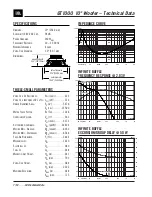
Page 3
Diagram One
6. Controls and System Setup
Subwoofer Controls
Accompanying the mains and signal input sockets on
the subwoofer connection panel are a
Power
switch, a
Volume Level
control, a
Crossover Frequency
control,
a
Phase
control and
Notch Frequency, Slope
and
Level
controls. Their functions are described in the
following paragraphs. Use of the controls to setup and
adjust the subwoofer is described in the
System Setup
paragraphs.
Power
The power switch incorporates an automatic switch-
on/off function. With the switch set to
AUTO
the
subwoofer will switch on automatically when an
audio signal is present. It will switch off again when
no signal has been present for around 0 minutes.
With
ON
selected the subwoofer remains switched-on
permanently.
Note:
There is a short delay between auto switch-on
and audible sound from the subwoofer.
Volume Level
The level control adjusts the volume of the subwoofer
relative to the satellites. Begin with the level control
set to around 50%. Detailed subwoofer adjustment
guidelines can be found in the following paragraphs.
Crossover Frequency
The crossover frequency control adjusts the upper frequency at which the
subwoofer output is filtered for the full-range speakers to take over. If the Aegis
Neo Subwoofer is to be used exclusively in an audio-visual system it should be
connected via the
AV Subwoofer Line Input
on which the Crossover Frequency
control is inoperative.
If the Aegis Neo Subwoofer is to augment the low frequency performance of a pair
of full range speakers, the crossover frequency should be set to match their low
frequency roll-off frequency. The larger the speaker, the lower its low frequency
roll-off will be. Finding the optimal crossover frequency setting will require
experiment and adjustment, but reasonable initial values for different speaker
types are as follows:
Large floor stand speaker (Aegis Neo 3):
45Hz
Medium stand mount loudspeakers:
60Hz
Small stand mount speakers (Aegis Neo ):
80Hz
Miniature satellite loudspeakers:
00Hz
Subwoofer Phase
The phase control varies the subwoofer acoustic phase (timing) with respect to the
satellites. With the switch set to 0° the subwoofer output is in phase with the full
range speakers. With the control set to 80° the subwoofer output is out of phase.
Adjusting the subwoofer phase can help optimise the sound of subwoofer systems.
Further subwoofer phase advice can be found below.
Notch Frequency
,
Slope
and
Level
The
Notch Frequency
,
Slope
and
Level
controls enable a targeted Notch Filter to
be applied to the subwoofer output. Such a filter can be useful in reducing the
audibility of any listening room resonances. The
Notch Frequency
control sets the
centre frequency of the filter, the
Notch Slope
control sets the sharpness of the
filter (maximum slope equals sharpest filter) and the
Notch Level
control sets the
depth of the filter. Setting the
Notch Level
control to
0dB
switches-off the filter.
System Setup
Before listening to your subwoofer and system make one final check of the cables
and connections. If all appears well begin listening at a relatively low volume to
confirm that the system is operating as expected. Only increase the volume if you
are happy that the sound at low volume is fundamentally as expected. If you are
unhappy, turn the system off and re-check all the cables and connections.
The Aegis Neo Subwoofer may take a little time to reach normal operating
temperatures and to “run-in”. Your ears too will take some time to adjust to the new
sound, so it is unwise therefore to make rapid judgements about the performance
of the system.
The most important aspect of the Aegis Neo Subwoofer setup is its integration
with the satellite speakers. Assuming the locations chosen for these are satisfactory,
adjusting the subwoofer’s location
in the room, its
Volume Level
and
Phase
, and, if
it is used in a conventional stereo system, its
Crossover Frequency,
should enable a
good result to be achieved. Leave the
Notch Level
control initially at 0dB.


























